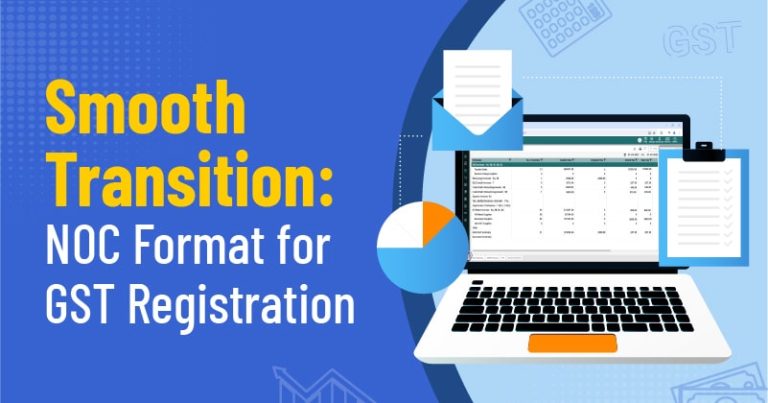In the world of business, transitions are inevitable. Whether it’s expanding your operations, changing your business structure, or even just registering for new licenses and permits, each step requires careful consideration and adherence to legal requirements. When it comes to Goods and Services Tax (GST) registration in India, obtaining a No Objection Certificate (NOC) plays a crucial role in ensuring a smooth transition. In this blog, we’ll delve into the NOC format for GST registration, breaking down the process into simple terms for easy understanding.
Understanding GST Registration
Before diving into the NOC format, let’s grasp the basics of GST registration. GST, implemented in India from July 1, 2017, is a comprehensive indirect tax levied on the supply of goods and services. Any business whose turnover exceeds the prescribed threshold limit is required to register for GST. Registration under GST provides various benefits, including legal recognition, the ability to avail input tax credit, and compliance with tax laws.
Importance of NOC for GST Registration
Now, why is the NOC necessary for GST registration? Well, the NOC serves as proof that the landlord or owner of the premises has no objection to the tenant conducting business activities and registering for GST at that location. Since GST registration involves providing a business address, obtaining an NOC from the landlord ensures that there are no legal hurdles in operating from the specified premises.
Components of NOC for GST Registration
- Name and Address: The NOC should clearly state the name and address of both the landlord and the tenant (business entity).
- Description of Premises: It should include details about the premises, such as the address, area, and any other relevant information that identifies the location where the business will operate.
- No Objection Statement: The NOC must explicitly state that the landlord has no objection to the tenant using the premises for business purposes, including GST registration.
- Signature of Landlord: To validate the NOC, the landlord must sign the document along with mentioning the date.

NOC Format for GST Registration
Here’s a NOC format for GST registration:
[Landlord’s Letterhead or Official Address]
[Date]
To,
[Name of GST Registration Authority]
[Address]
Subject: No Objection Certificate (NOC) for GST Registration
Dear Sir/Madam,
This is to certify that I, [Landlord’s Name], residing at [Landlord’s Address], am the lawful owner/authorized representative of the premises located at [Address of the Premises]. I hereby declare that I have rented/leased the said premises to [Tenant’s Business Name] for the purpose of conducting their business operations.
I have no objection to [Tenant’s Business Name] using the aforementioned premises for their business activities, including but not limited to, obtaining GST registration. I understand that [Tenant’s Business Name] will use the said premises solely for lawful purposes and will comply with all statutory requirements and regulations.
Furthermore, I confirm that there are no pending legal disputes or encumbrances related to the said premises that would hinder or affect [Tenant’s Business Name]’s ability to operate their business or obtain GST registration.
I have affixed my signature below as a token of my consent and authorization for [Tenant’s Business Name] to proceed with the GST registration process using the specified premises.
Thank you for your attention to this matter.
Sincerely,
[Signature of Landlord]
[Printed Name of Landlord]
[Contact Information of Landlord]
Key Points to Note:
- Ensure that the NOC is printed on the landlord’s official letterhead or includes their official address for authenticity.
- Clearly state the purpose of the NOC, i.e., for GST registration.
- Provide accurate details of the premises and the parties involved.
- The landlord’s signature is essential for validation.
- Include contact information for further communication if required.
Submitting the NOC for GST Registration:
Once the NOC has been drafted and signed by the landlord, it needs to be submitted along with the GST registration application. Here’s how the process typically works:
- Completion of GST Application: The applicant (business entity) fills out the GST registration application form online on the GST portal, providing all necessary details including the business address.
- Upload of Documents: As part of the application process, various supporting documents are required to be uploaded. This includes documents such as proof of business ownership, identity and address proof of promoters/partners/directors, and the NOC for the premises.
- Verification by GST Authorities: Once the application and documents are submitted, they are reviewed by the GST authorities. This may involve scrutiny of the provided documents and verification of the details provided.
- Granting of GST Registration: Upon successful verification, the GST registration certificate is issued to the applicant. This certificate serves as proof of registration under the GST regime and allows the business to commence its operations compliantly.
Importance of Accurate Documentation:
Accurate documentation, including the NOC for GST registration, is essential to ensure compliance with legal requirements and to avoid any delays or complications in the registration process. Any discrepancies or incomplete information may lead to rejection of the application or delays in obtaining the GST registration certificate.
Conclusion:
In conclusion, obtaining a No Objection Certificate (NOC) for GST registration is a crucial step in the process of registering a business under the Goods and Services Tax regime in India. The NOC serves as proof of the landlord’s consent for the business to operate from the specified premises and is a mandatory requirement for GST registration. By following the prescribed format and ensuring accurate documentation, businesses can navigate the registration process smoothly and commence their operations in compliance with tax laws.
Also Read:
- Why Would a Business Need to Cancel GST Registration?Goods and Services Tax (GST) has streamlined indirect taxation and brought about a unified system across the country. But while registering under GST is mandatory for many businesses, there may come a time when cancelling GST registration becomes not just… Read more: Why Would a Business Need to Cancel GST Registration?
- Why Should You Use Software for Your Annual GST Return?The annual GST return demands attention because filing it proves challenging. Does the procedure appear complicated together with being time-intensive? If so, you’re not alone! Companies encounter annual problems when they try to bring together their GST data for compliance… Read more: Why Should You Use Software for Your Annual GST Return?
- Why Is Timely GST Payment Important for Your Business?As the backbone of India’s taxation system, Goods and Services Tax (GST) plays a pivotal role in simplifying the business environment. However, it also brings with it a host of compliance requirements that businesses must navigate. Among these, timely GST… Read more: Why Is Timely GST Payment Important for Your Business?
- Why Is the Registration Process in GST Important for Businesses?The registration process in GST is not just a statutory obligation for businesses in India – it’s a crucial step that sets the foundation for seamless business operations, tax compliance, and overall growth. Whether you’re a budding entrepreneur or a… Read more: Why Is the Registration Process in GST Important for Businesses?
Frequently Asked Questions
What is a No Objection Certificate (NOC) for GST registration?
A No Objection Certificate (NOC) for GST registration is a document issued by the landlord or owner of a premises, stating that they have no objection to the tenant using the specified premises for conducting business activities and registering for GST.
Is obtaining an NOC mandatory for GST registration?
Yes, obtaining an NOC from the landlord or owner of the premises is mandatory for GST registration in India. It serves as proof of the landlord’s consent for the business to operate from the specified location.
Who needs to obtain an NOC for GST registration?
Any business entity that operates from rented or leased premises and wishes to register for GST must obtain an NOC from the landlord or owner of the premises.
What information should be included in an NOC for GST registration?
An NOC for GST registration should include details such as the name and address of the landlord and tenant, description of the premises, a statement of no objection from the landlord, and the landlord’s signature.
Can an NOC for GST registration be obtained for virtual or shared office spaces?
Yes, an NOC for GST registration can be obtained for virtual or shared office spaces. However, the document should clearly specify the address of the virtual or shared office space and the consent of the relevant authority or owner.
Is there a specific format for an NOC for GST registration?
While there is no standardized format prescribed by the government, an NOC for GST registration typically includes certain key components such as the landlord’s details, premises description, no objection statement, and signature.
Can an NOC for GST registration be revoked?
Once issued, an NOC for GST registration is generally not revoked unless there are specific reasons such as breach of terms or termination of the lease agreement. However, the specific terms and conditions may vary depending on the agreement between the landlord and tenant.
Is an NOC for GST registration required for home-based businesses?
If the business operates from a residential property, obtaining an NOC for GST registration may not be necessary. However, it is advisable to check with the local authorities or seek legal advice to ensure compliance with applicable regulations.
How long is an NOC for GST registration valid?
An NOC for GST registration is typically valid for the duration of the lease agreement or as specified in the document. If there are any changes in the tenancy or premises, a new NOC may need to be obtained.
Can an NOC for GST registration be used for other purposes besides GST registration?
While the primary purpose of an NOC for GST registration is to obtain consent for operating a business and registering for GST, it may also be required for other purposes such as obtaining licenses or permits from local authorities. However, the specific requirements may vary depending on the nature of the business and applicable regulations.








